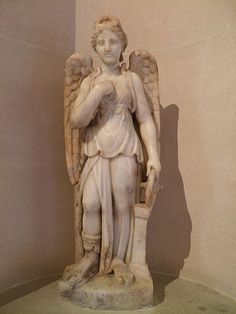
Nemesis
Nemesis:: The Goddess of Retribution
Nemesis, in Greek mythology, was the goddess of divine retribution and revenge. She was revered and feared as a deity who delivered justice, especially against those guilty of hubris, the sin of excessive pride or arrogance before the gods. Unlike other deities who could be benevolent or malevolent, Nemesis was known for her implacable nature.
Divine Justice and Wrath
As the embodiment of divine retribution, Nemesis played a pivotal role in maintaining the balance of justice in both human and divine realms. She was particularly focused on punishing those who committed arrogance against the gods, ensuring that balance and order were preserved. Her influence extended to various aspects of life and was often invoked in legal contexts and moral teachings.
Nemesis' Role in Literature
Nemesis was a central figure in Greek tragedies and numerous other literary works, often portrayed as the force that brings about the downfall of the proud and the powerful. As the "Goddess of Rhamnous," she was worshipped in a temple in the isolated region of Attica, indicating her significant place in the religious and cultural landscape of ancient Greece.
The Lineage of Nemesis
The parentage of Nemesis is subject to varying accounts. While some sources mention her as a daughter of the primordial god Oceanus, Hesiod, a renowned Greek poet, described her as a child of Erebus and Nyx, the personifications of darkness and night, respectively. This dual lineage reflects her complex nature as a deity.
Nemesis and Narcissus
One of the most famous myths involving Nemesis is that of Narcissus. In this tale, she enacts her role as the arbiter of justice by punishing Narcissus for his arrogance and disdain towards those who loved him. Leading him to a pool, she orchestrated the circumstances that caused Narcissus to fall in love with his own reflection, ultimately leading to his demise.
The Progeny of Nemesis
A lesser-known yet intriguing myth about Nemesis is her connection to an extraordinary egg. According to the legend, this egg gave birth to two sets of twins: Helen of Troy and Clytemnestra, and the Dioscuri (Castor and Pollux). This story connects Nemesis to some of the most pivotal characters in Greek mythology and highlights her influence on the epic tales of the Trojan War and beyond.
Nemesis in Modern Culture
Today, Nemesis continues to be a symbol of the inescapable nature of justice and retribution. Her name has been adopted in modern languages as a term for an unbeatable rival or a source of rightful downfall, reflecting her enduring legacy as the goddess who ensures that hubris does not go unpunished.
Nemesis Video
Nemesis Q&A
Link/Cite Nemesis Page
Written by: The Editors of GreekMythology.com. GreekMythology.com editors write, review and revise subject areas in which they have extensive knowledge based on their working experience or advanced studies.
For MLA style citation use: GreekMythology.com, The Editors of Website. "Nemesis". GreekMythology.com Website, 30 Nov. 2023, https://www.greekmythology.com/Other_Gods/Nemesis/nemesis.html. Accessed 26 April 2024.
